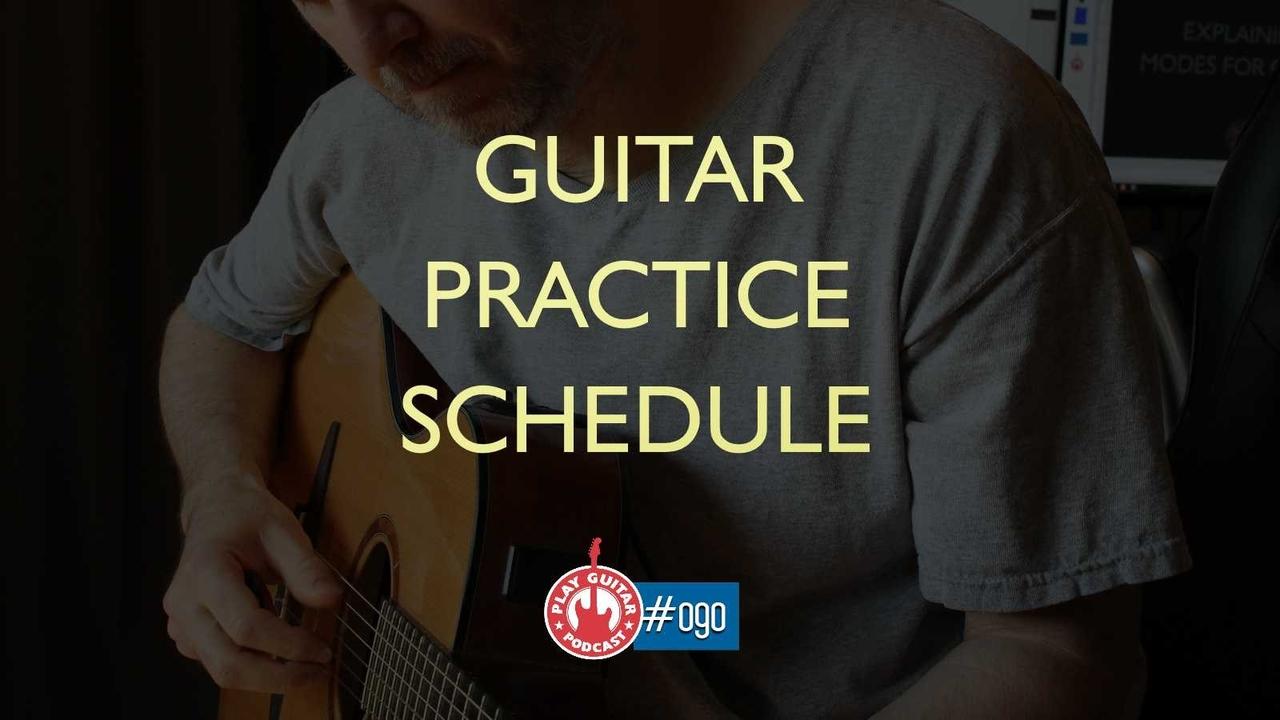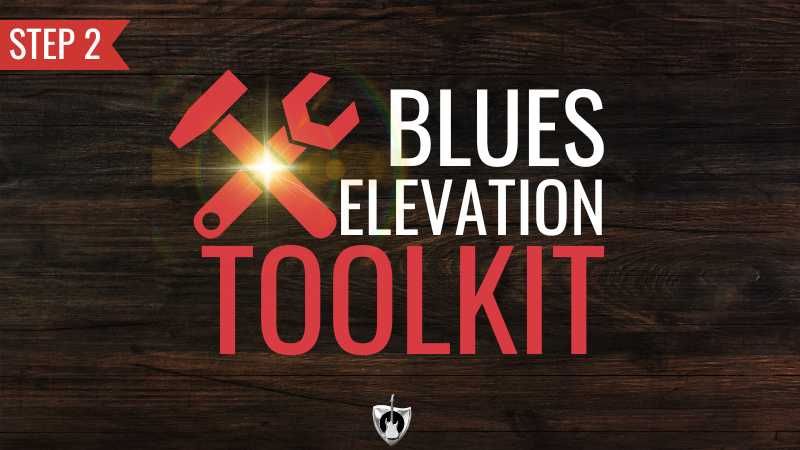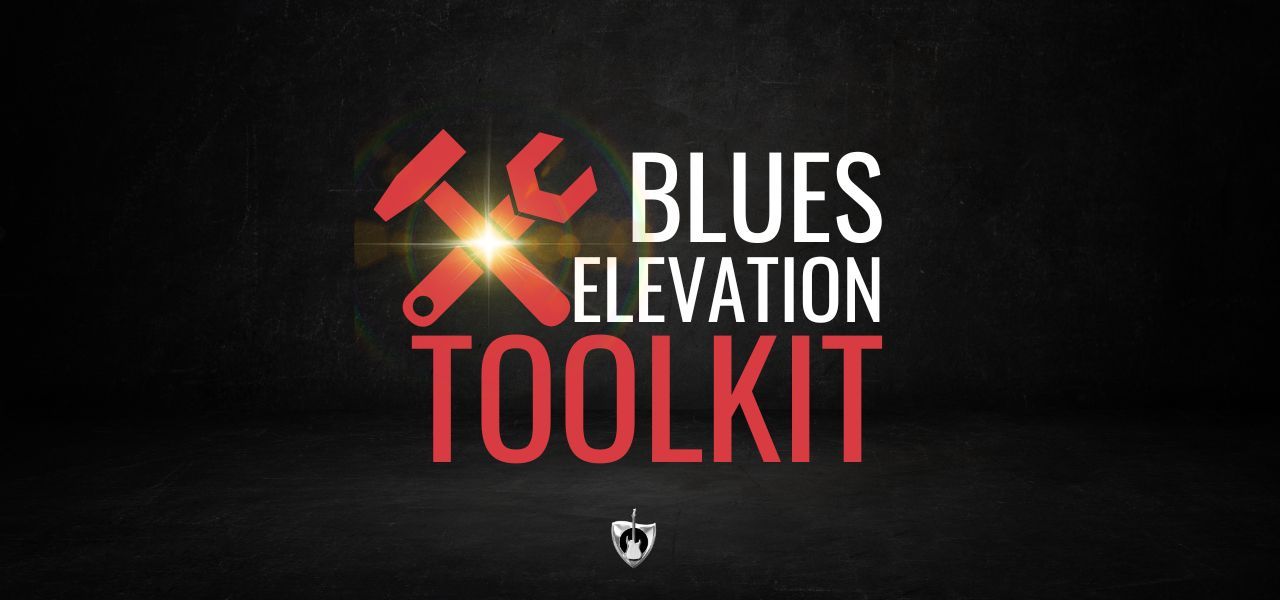Guitar Practice Schedule - 090

How can I redesign my practice schedule to get the best results for me?
Today I'm gong to help you with your schedule by asking you four questions. I’ll unpack each of these questions and present you with some things that you may not have thought of. At the end of each question, I’d like you to answer it with a very small direct sentence. After we are done, the answers to these questions will give you the guideline to the most effective schedule for you and what you need to look out for to keep it successful for as long as you play guitar.
1.How long do I practice?
Well, how long should you practice? The common consensus is 10,000 hours to master your instrument. Ouch.. I know what you are thinking. Please, don’t try to do the math on this one. You will be defeated before you begin.
I know it sounds like a big goal, and super achievers get excited and their eyes start to get wide. But, this kind of approach leaves a lot of players in the dust. Just putting your hours in without any direction is completely inefficient. And who says that you couldn’t achieve the exact same goal in half the time by really targeting your practice.
I’ve seen big progress in students who learn in small, deliberate, daily chunks. When this is put into place something else happens as well, a change in attitude. A very healthy change in attitude.
You stop trying to conquer the guitar and start living the life of a practicing musician. The stress of achievement vanishes. Wishing that you could play something difficult makes way for a new confidence that you can learn most anything you set your mind to, when you apply it to your practice routine.
This confidence happens very quickly because you get used to achieving small goals on a very routine basis. These small goals combine (your skills build) to make it easier to achieve bigger goals.
Picking a session length is a very personal thing. The most important thing is finding out what is the length that works for you and stick to it. The trick is figuring out the time that you are most effective.
If you can usually focus well for 20 minutes, but after that your mind starts to wander, a 45 minute session is not for you. I’d suggest that that extra time that you are spending is wasted and it can be demoralizing as well. In my experience students get frustrated when the don’t see results from large time spent practicing.
Pay attention to your next practice and with special attention to when you start to fade. Then make a little note on your practice sheet . Do this over a week or so and see if you can see a trend. I would think that number that you come up with would be a great session length for a daily practice.
Of course, you have to be realistic. If you can focus for an hour but that hour of practice doesn’t fit with the rest of your life, you would need to trim it down a bit.
10, 15, 20, 30, 45, and 1 hour or more practice sessions can all be effective and can also all be wasted if you aren’t in a good state to learn and refine your playing.
So that being said, take a minute and think about how long you should practice. Write it down if you can.
2. When should I practice?
Mornings, all of them. There you go, done… next. Just kidding!
Obviously, there isn’t a best time. There are way too many variables. Your daily life schedule will usually dictate when you should practice . But if you are lucky enough to be flexible with your schedule, I think we can take a lesson from the last question and apply it here.
Figuring out when you are the most effective during the day can really take your practice to the next level. Here is another place where practice and exercise are very similar.
I know that If I exercise too late at night, I don’t get the results that I want. I don’t try to move my reps or speed up at all. It’s just enough for me to get through the exercise routine. And beyond that I have a problem getting to sleep and waking up on time the next morning. I’m not effective exercising at night, so I don’t do it.
If you are able to, try for a week to practice at different times each day. Write down the way you feel when you are practicing. Which times are you the most alert and have the most fun? Make a note of what part of the day that you did the best or had a breakthrough on the guitar.
Then answer the question: What time should I practice guitar?
3. What should be the structure of my practice?
Aimless practice is fun. I’m just being honest. It’s fun to just experiment and play. It’s not just fun, it’s important. Having fun playing your instrument is essential. If you aren’t having fun, you are going to quit. That’s all there is to that.
The problem is that it’s very tempting to spend all of your time having fun and not learning anything new. And eventually the frustration takes over when you realize that all of this fun hasn’t got you where you want to be.
I say this a lot because in my experience most of my guitar students are very polarized.
On one side you have the "practicers" who are very structured. They practice and practice and develop good skills trying to make things perfect. The surprising thing that I’ve found with them is that they rarely play music for anyone.
And when I convince them to play in front of an audience, it’s quite a transition. A lot of fear and frustration of messing up and what people might think leads to exhilaration after finally getting the nerve to do it.
On the other side you have the "players". They are guitarists who have a much more relaxed approach to the instrument. They love to play and have fun, but I’ve found that they eventually get frustrated because of lack of progress.
In my opinion, both sides of this are important. The practice routine that I like to set up with my students the most is a 50/50 routine. Half intense skill study and half improvisation and repertoire. It’s super well rounded and can be structured for any players situation.
And when you combine it with a daily sensible routine that change in attitude to a calm practicing musician that I mentioned before really kicks in.
Take a listen to last week's podcast (89 if you haven't yet) to discover the truth to the things that are lacking in your playing. These will be the skill you will refine in your practice section.
Next find several new songs that you like to play or improvise over. This will be your play section.
Splitting your practice time in half with these two sections will give you a super simple and highly effective practice routine. The best of both worlds… regular consistent happiness and achievement on the guitar.
One last thing that I want to cover today is for gigging musicians. For those who made it past the woodshed and on to the stage, you have a different set of issues.
A very common problem with gigging musicians is that the focus now is on new songs and sets to play. Rightfully so! The time crunch of getting a set together is all consuming. Just when you have things under control, someone wants to learn a whole new group of songs and the cycle continues. It’s so easy to stop actually progressing on your instrument.
Keeping a 50/50 routine, even when you are gigging, is highly recommended.
Now answer this question: What should be the structure of my practice?
4. How do I keep my practice fresh?
Having a stale practice routine can happen to anyone. We all need to change things up every once in awhile to keep our interest.
Try changing up your routine along with the seasons of the year. Every three months, reevaluate what you are interested in playing on guitar and replace some of the things you are practicing with them. Aliging your practice with your interests is something that I’ve used in my own practice and I’ve gotten great results.
Plan a vacation! Take some time off to let all of your hard work sink in. Even if you are just staying at home a good intentional break from the guitar is great for your mind set. It gives you some time to think about all of your accomplishments and the direction of your playing. These breaks are a great time to do planning for your future practice schedules.
So taking this into consideration, answer the question: How am I going to keep my practice interesting this coming year?
Summary
Creating an effective Guitar Practice Schedule when you don’t have help can be challenging but not impossible. Today I showed that by answering these four short questions, you can not only get back on track but streamline your practice to get steady predictable results.
And they were:
-
How long do I practice?
-
When should I practice?
-
What should be the structure of my practice?
-
How am I going to keep my practice fresh?
Now that you got some truth about your playing from last week and you have your optimized practice schedule together, it’s time to put the icing on the cake.
You need a dedicated space that is distraction free and optimized for stress free learning. So in this simple pdf checklist I have that you can get at playguitaracademy.com/practice . Download it for free, print it out, take it right to where you practice, read it, look around and get real about your surroundings. make sure that where you practice isn’t holding you back.
Just wanted to tease that I’ve got something very special coming for beginners and also for those of you who started playing guitar and you are not sure what you are doing is right. You might feel like you missed out on some ground floor stuff: the fundamentals. Thats coming in the next few weeks. You will be hearing a lot more about it here, I’ve got some sneak peeks coming up soon for those who get my newsletters. So, if you would like to get a little behind the scenes peek head over to playguitaracademy.com and sign up!
GET FREE WEEKLY GUITAR LESSONS, PODCASTS, AND MOTIVATION DELIVERED TO YOUR INBOX.
Your information is kept safe. It's never shared with third parties.




